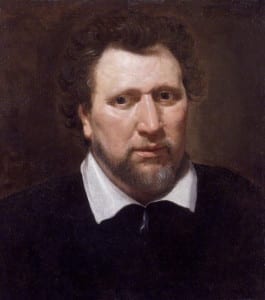Poet Ben Jonson was a towering figure among the English writers of the late 16th and early 17th centuries. Although William Shakespeare is now regarded as the most significant writer of the time, and indeed, of all time, Jonson dominated the playwriting scene during that period.
He was a satirist, playwright, poet and essayist and he was, in fact, the consummate writer. He was a very different kind of writer than Shakespeare, with an interest in the failings and stupidity of authority, dealing with those things in a far more overtly political, satirical way than Shakespeare did. That got him into trouble with the authorities: in 1597 he was imprisoned in the Fleet prison for his involvement in a satire, The Isle of Dogs.
Ben Jonson was born in 1572 and educated at Westminster School. He worked as a bricklayer but, disliking it, he abandoned the trade and joined the army, and served in Flanders. When he returned to England in 1594 he joined Philip Henslowe’s theatrical company. In 1598 he was condemned to death for murdering a fellow actor, but escaped the gallows because his father had been a clergyman he was able to plead benefit of clergy, which allowed him to be placed outside the authority of the secular court. He went to prison for a short while and when he was released he started his literary career in earnest.

Portrait of Ben Jonson
His big break came with his second play, Every Man in his Humour, which was performed by the Lord Chamberlain’s Men at the Globe theatre. It is the one play, apart from his role as the ghost in Hamlet, that we know included Shakespeare in the cast, although we do not know which role he played. The play made Jonson a celebrity and from there he became the great literary figure of the age.
He was imprisoned again in 1603. His classical tragedy, Sejanus, His Fall, about dictatorship, was a bit too close for comfort for authority and he was called before the Privy Council to answer charges of ‘popery and treason.’ He got off for that but the authorities hounded him and he was imprisoned with two other writers, Marston and Chapman for ‘controversial views.’
The masque, a theatre form that combined all the arts – music, drama, art, dance – became fashionable at the beginning of the 17th century, and Jonson immersed himself in writing masques and became the leading pioneer of the form. He had a strong following among other writers, including Shakespeare, and finally he became a respectable citizen in the eyes of the authorities, even being appointed poet laureate in 1616, with a substantial pension.
He died in 1637 aged 65 after having been incapacitated by a stroke nine years previously. His tomb in Westminster Abbey is inscribed with the simple text: ‘O rare Ben Jonson.’
His plays are funny, deep and interesting, with stories that go to the heart of what it is to be a human being. The most famous are performed regularly – plays like The Alchemist, Bartholomew Fair, The Devil is an Ass, Every Man in his Humour, A Tale of a Tub and Volpone.
Ben Jonson wrote many poems, and is without doubt one of the greatest English poets. It is difficult to imagine English culture without, for example To Celia, which became one of the most popular Victorian songs:
To Celia, by Ben Jonson
Drink to me, only with thine eyes,
And I will pledge with mine ;
Or leave a kiss but in the cup,
And I’ll not look for wine.
The thirst, that from the soul doth rise,
Doth ask a drink divine :
But might I of Jove’s nectar sup,
I would not change for thine.
I sent thee late a rosy wreath,
Not so much honoring thee
As giving it a hope, that there
It could not wither’d be.
But thou thereon didst only breathe,
And sent’st it back to me :
Since when it grows, and smells, I swear,
Not of itself, but thee.
His poem on the death of his seven year old son is the definitive statement of a father’s thoughts and feelings on such an event.
On My First Son, by Ben Jonson
Farewell, thou child of my right hand, and joy ;
My sin was too much hope of thee, lov’d boy.
Seven years thou wert lent to me, and I thee pay,
Exacted by thy fate, on the just day.
Oh, could I lose all father now ! For why
Will man lament the state he should envy?
To have so soon ‘scaped world’s and flesh’s rage,
And if no other misery, yet age !
Rest in soft peace, and, asked, say, Here doth lie
Ben Jonson his best piece of poetry.
For whose sake henceforth all his vows be such
As what he loves may never like too much.
Read more about Shakespeare’s other contemporaries >>




Leave a Reply
Want to join the discussion?Feel free to contribute!